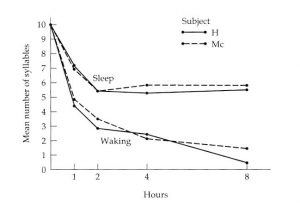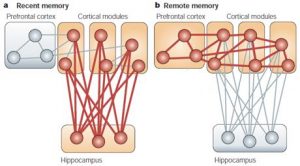MADELEINE YU | SQ ONLINE | BLOGGER 16-17
Well folks, the weeks have zipped by and I hate to be the one to say it, but Finals Week is here. The already-packed Geisel will be the first place to go and believe me, I won’t be anywhere near there when chaos ensues. Every ten weeks, it’s the same old story: upon realization of the dwindling time that we have left to pack our brains with podcasts and readings, panic will strike. Tensions will rise. Coffee will start to look like our only saving grace. Forget cooking–instant ramen is where it’s at. I’m sure it’ll feel like pulling all-nighters is the only option, but I’m going to propose an alternative. It may sound crazy and counterintuitive, but trust me on this one.
Just go to sleep.
By sleep, I don’t mean for you to give up because it’s already too far gone for you to even try cramming. No, no. Just the opposite. Besides being something that we need to feel rested and sane, sleep is also extremely important for memory.
Sleep to Remember
As early as the 1920’s, scientists have questioned the role of this state in which we spend so much of our time. In fact, on average, a human will spend about a third of their life asleep! This intrigued psychologists John G. Jenkins and Karl M. Dallenbach so much that they decided to test whether sleep has anything to do with how we remember. In their study, they presented participants with lists of nonsense syllables that were to be committed to memory. After this “learning” phase, the participants were split into two groups: one would get to sleep after learning and the other would stay awake until the “testing” phase. As it happens, those that slept actually forgot less of the nonsense syllables than those who that stayed up, even though the same amount of time had passed in between the two phases.

This study has been repeated through the years in many ways. The importance of sleep has even been proven in mammals other than humans. A recent study done in May 2016 by researchers from McGill University and the University of Bern examined the consolidation of memories in mice. What made this study so important was the use of optogenetics. This form of technology uses light to selectively control the activity of certain neurons.

While Jenkins and Dallenbach yielded significant results that expressed a correlation between sleep and memory, causation could not be proved since there was no way to independently test the neurons during sleep–that is, until now. In this optogenetic study, mice were trained to spot a new object in a controlled environment where two other objects of similar shape and volume were already placed. Identifying a new object in familiar surroundings is an easy task that guarantees a focused learning towards novelty. Contrary to the sleep-wake human study in 1924, all mice were allowed to sleep. However, in some mice, the memory-associated neurons were inactivated via optogenetics during sleep. These mice, when compared to a control group, appeared to have no recollection of the novel object from the other day. It was as if the memory had been erased entirely.
Interestingly, deactivating the neurons while the mice were awake had no effect on remembering; there must be specific brain activity during sleep, and only sleep, that facilitates the consolidation of memories.
Case in Sleep
There are some personal accounts of extraordinary feats taking place after a good night’s rest. One popular example involves learning to play musical pieces. For those who have learned or are learning to play a musical instrument for the first time, you know the awkward feeling of attempting to play something, anything, that sounds remotely like a melody. But your timing is off and–lordy–you keep hitting the wrong key. So, in frustration and exhaustion, you go to sleep. Then in the morning? Eureka! You play the melody as if you were a natural-born prodigy. Well, not exactly, but it is still pretty amazing.
A team of researchers from Brown University examined this curiosity in 2013. They brought in some people to learn a simple sequence on a keyboard and then allowed half of the group to sleep for a couple of hours. Not surprisingly, the group that slept performed better than those who had remained awake. When the brain activity of those that slept was analyzed, the researchers noticed that a specific part in the motor cortex area of the brain, the Supplementary Motor Area (SMA), seemed to correlate the most strongly to the participants’ performances.
A Link to the Past
This makes a lot of sense if you know how memories are formed. When you experience an event, neurons in specific parts of your brain are active, allowing you to comprehend what you see, hear, smell, touch, or taste. Another part of your brain–the hippocampus–works to link the separate neurons together so that later on, you can recall the consolidated memory by activating one of the linked neurons by itself. This is what happens when a specific scent triggers a flashback to a memory you thought was long gone or when a certain spoken phrase can bring back a flood of thoughts that had once passed through your mind.

In the case of the Brown University study, the participants that learned to play a certain sequence on the keyboard had activity in the SMA, an area that is known to relate to the sequencing and planning of movement. Now what is significant is that the activity of this area took place while the participant was asleep. The Brown researchers were observing the consolidation of the keyboard sequence in real time! Thus, when the participants awoke, they were able to recall how to play the keyboard more readily than those who did not have the sleep they needed to link up the neurons of a memory.
There is a slight drawback to consolidating memories while you sleep, though. It turns out, while your hippocampus works to consolidate your memories of the past day’s events, the encoding function is shut down. In other words, you cannot gather information for new memories while you sleep, which might explain why it is so hard to remember your dreams. I know, it’s unfortunate, but if that’s what’s needed to help us through finals I’d say it’s worth it. So let’s all take a deep breath now, get some sleep, and KILL IT on dem Finals. Best of luck to everyone and have a great Spring Break!
[hr gap=””]
References
- http://learnmem.cshlp.org/content/13/3/259.full.html
- http://www.jstor.org/stable/1414040?seq=1#page_scan_tab_contents
- https://www.psychologytoday.com/blog/the-athletes-way/201605/no-1-reason-having-vivid-dreams-benefits-your-brain
- http://articles.latimes.com/2013/aug/20/science/la-sci-sn-sleep-music-20130820